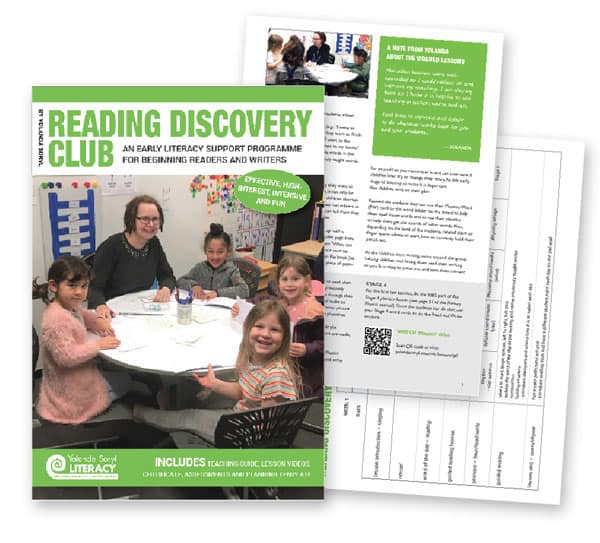Frequently asked questions
Reading Discovery Club
Is Reading Discovery Club the same as Early Literacy Support?
Basically yes. Yolanda devised this programme in the U.K. where it ran for many years with Yolanda at the helm, leading training and supporting programme delivery. It was called Early Literacy Support and was run under the auspices of Reading Recovery.
Back in New Zealand, Yolanda was excited years later to take up an offer again for Reading Recovery teachers to run Early Literacy Support in their schools. Having run it before, she knew what to do and enthusiastically took up the challenge.
However, the New Zealand version of Early Literacy Support is intended to be team-taught with the New Entrant teacher. This was not possible in Yolanda’s school and so because the programme could not be run as the MOE intended, and because a more child-friendly name was wanted, it was called Reading Discovery Club instead.
Reading Recovery teachers running Early Literacy Support are welcome to use Yolanda’s Reading Discovery Club lesson plans, ideas and activities for their own programmes.
Why is the downloadable version of the manual free?
After a tough couple of years for teachers, and with the associated setbacks for children’s learning, I just want to help. I think the best way I can do that is to give away the structure and approach I follow when getting tamariki on track for success in literacy. I have used this method for many years as a class teacher and as a support teacher and I have taught it to hundreds of teachers and teacher aides too. It works.
Why is the phonics section in the video so short? Shouldn’t more time be spent on teaching phonics?
Children do need more time learning phonics than the few minutes allowed in the Reading Discovery Club. It is assumed that outside of the club, students will be participating in a daily dedicated phonics lesson in their classroom. Therefore, the time spent in the Reading Discovery lesson on phonics can be short. If this is not the case, you may wish to reconsider the lesson timings to spend more time explicitly teaching phonics.
My students are doing well except one who is struggling. What shall I do?
If the group is too advanced for your student, probably they should not be coming because they need teaching at their level. Struggling every day is not fun for them. Perhaps take the student out of the club and have them come back next term with a new cohort at the same level when they are ready. But if you believe that the student is best to stay, have them sit beside you and give them more support with the activities.
In the guided reading video, you didn’t prompt much for phonics. Why did you prompt for other strategies to get the words instead?
Students at the very early levels of reading, such as the students in the video, haven’t learnt enough phonics yet to be able to use it other than getting the first sound in a word. Hence the prompts to use context/word recognition/grammar in the video. These are still good strategies to prompt because good readers do need to use all the information. However, once the students have learned how to decode, then the first prompt should be to decode the word and then use the other cues to confirm.
We don’t have the Early Words Readers in our school? Can we use PMs or another scheme?
Yes of course you can. You will need to work out an effective teaching sequence for your reading books so that children aren’t reading books with too many words they don’t know yet. The advantage with the Early Words Readers is that the sequence is worked out for you.
Four books/words a week is too fast for my group. They are forgetting it the next day. Can I go more slowly?
Yes, do one book/word every second day and spend two days on the same book/word with a focus on fluency and expression for the second day. You might find once the children are underway, you can go faster. But only if they are coping well. Don’t lose the pace of your lesson though.
We do Jolly Phonics in our school. Can we use that for the phonics component?
Yes, you can use any phonics scheme you like. Just ensure you can get cards with the letter on one side and a picture of the mnemonic on the other for quick revision.
Can I use decodable readers for the guided reading part of the lesson?
Yes, you can use any reading book you like. Decodables provide excellent opportunities for children to use decoding skills. But to ensure variety, consider mixing them up with other reading materials too.

